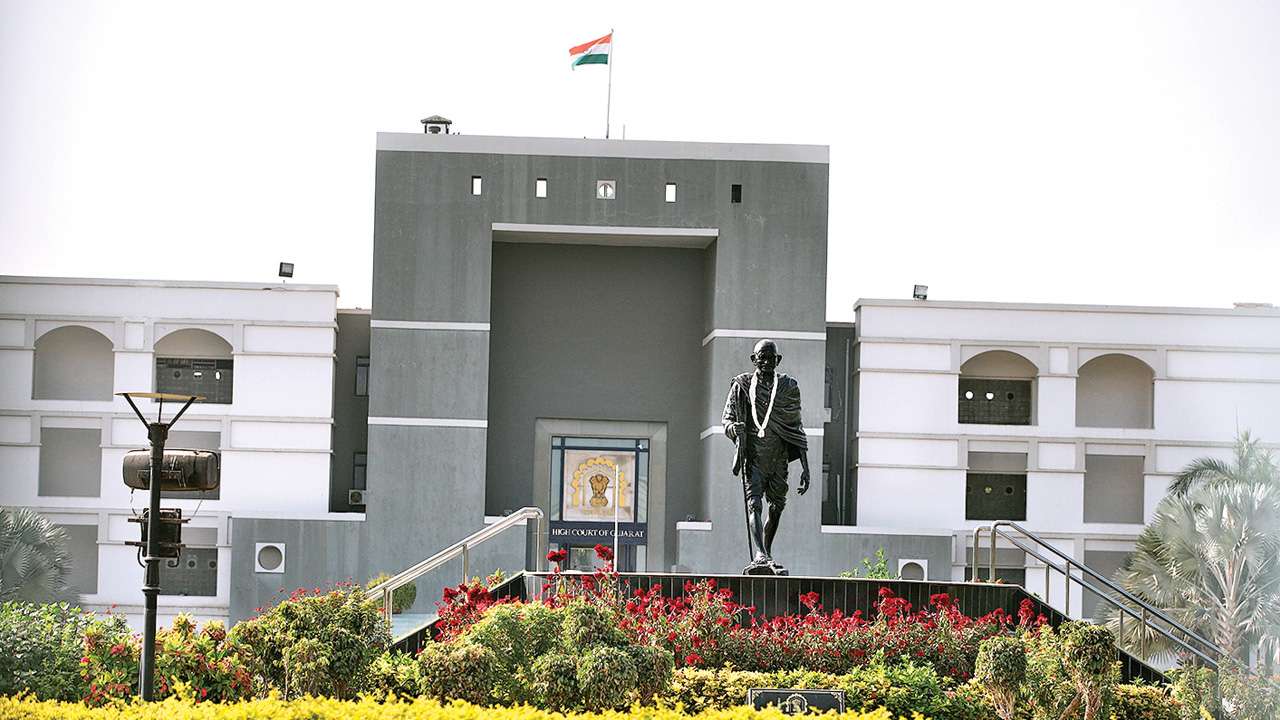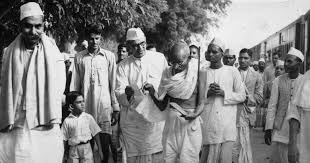Gandhi Labour Philosophy and Arbitration : A Case for Research
Dhimant S.Vasavada
The principle of arbitration exists since the birth of the mankind. Knowingly or unknowingly everybody puts into practice the principle of arbitration. Even in a joint family, when there was a dispute between two brothers, they will accept willingly the decision of father or mother. It has also roots in Bhagwat Gita, in second chapter Sloka no.42, Lord Krishna asks Arjuna “Karmanyevadhikaraste Ma Falesu Kadachanan” do your duty and leave the results unto me. Everybody knows that in Mahabharat the Lord Krishna acted as a mediator as well as arbitrator. In the same way Henry Wadsworth also says“Do thy duty that is the best, leave unto God all the rest”. Thus in primitive days the God was accepted as arbitrator. Gandhi learnt this lesson by heart and made the arbitration as basic plank of Gandhian Trade Union Movement. He also believed that the arbitration involves tripartite mechanism of knowledge, action and devotion. Gandhi set in motion this mechanism in such a manner that labour movement is transformed into manifestation of truth, non-violence and industrial peace.
The success of arbitration depends much on the intention of the parties to the arbitration agreement. I can cite a unique case of arbitration agreement entered into under Section 10(A) of Industrial Disputes Act, 1947. In 1983 the erstwhile Gujarat Electricity Board and GEB Engineers Association entered into an agreement referring the dispute to the arbitration of late Shri G.S.Barot, the President of Industrial Court of Gujarat. The arbitrator rendered final Award on 28-6-1995. In the memorandum of Arbitration Agreement dated 30-9-1983 it was clearly agreed between the parties that neither party will challenge the Award of Arbitrator and will accept it in true spirit. Despite this, the Award was challenged in the High Court and the High Court admitted the petition in 1996 which is numbered as Special Civil Appln.632/1996. The Hon’ble Gujarat High Court dismissed the petition on 22-11-2019. The Gujarat Electricity Board now converted into Gujarat Urja Vikas Nigam Ltd., has also challenged the judgment of the Gujarat High Court by filing Intra Court Appeal but however, because of the pandemic no progress is made and the engineers who are beneficiaries, are deprived of monetary benefits. It is equally pertinent to note that more than 50% of the engineers have expired during the span of 39 years. This is the reason that the parties are required to preserve the sanctity of arbitration and the parties should abide themselves by the verdict of the arbitrator. This is also necessary because ultimately, even the legal battle should attain finality during the life time of the arbitrator as well as the parties to the arbitration agreement.
On giving deep thought to the frame work of our all relevant laws, be it Civil Law, Labour Law, Commercial Law or Constitution of India, one can infer that principle of arbitration is omnipresent in all the laws. Thus, directly or indirectly any legal practitioner when argues the matter in any court, he invokes the principle of arbitration. The Textile Labour Association has been confronted with the problem of closures of the textile mills since 1981. The unfortunate case arose for 120 widows who lost their husbands when mill was not working but the closure was not legal. I therefore, on behalf of Textile Labour Association espoused the cause of 120 widows and filed a petition in the Gujarat High Court seeking the benefit of Deposit Link Insurance Scheme which was Rs.10,000 at that point of time. The Regional Provident Fund Commissioner took a pedantic view and refused to grant the benefit under the Provident Fund Act. After a lengthy arguments, the Gujarat High Court allowed the petition and directed the Provident Fund Commissioner to pay Rs.10,000/- to each of the widow with 12% interest. For the good fortune of these widows the Regional Provident Fund Commissioner accepted the verdict of the High court and paid the benefit. This judgment is reported in 1985.26(1) Gujarat Law Reporter.499. The ratio of this judgment is that if the closure is without the permission of the appropriate government and in violation of Section 25(F) & (FF) of the Industrial Disputes Act, 1947, such closures are illegal and the workmen are entitled to all the benefits under all the laws which are time being in force.
It is a unique case that the Gujarat High Court appreciated the plight of the widows and delivered the judgment very quickly within a span of 9 months. Here I am tempted to quote Mahatma Gandhi.
“We win justice quickest by rendering justice to the third party.”
The Gujarat High Court has also while granting relief to the widows has also followed Mahatma Gandhi.
But however, the workmen of closed textile mills and other non-textile Companies which are wound up by the Hon’ble High Court, are suffering from various agonies. Section 529 and 529(A) of the Companies Act, 1956, haves been inserted by the Parliament in the year 1985. The object of these amendment is to provide maximum relief to the workers of the liquidated Companies. The author through Textile Labour Association, filed many company applications and Gujarat High Court in 1999 interpreted Section 529 & 529(A) of the Companies Act and held that the following components are admissible as the dues of the workmen u/s.529 & 529(A) of the Companies Act.
- Unpaid wages from the date of closure till the date of winding up.
- Gratuity, under the Payment of Gratuity Act, 1972, as on the date of winding up order,
- Retrenchment compensation from the date of joining till the date of winding up order,
- Benefit of Leave Encashment upto the date of closure.
- Compensation payable under the Workman Compensation Act,1923,
This judgment was reported in 2000.Vol.IV.GLR.2923 and 999(II)LLJ.859, Textile Labour Association vs. Official Liquidator of Jubilee Mills Ltd.
However, the demand of the union to include the bonus and notice-pay was rejected by the High Court. All the workers in State of Gujarat have accepted the judgment and fortunately secured creditors though they filed Appeal, withdrew their Appeal. Thus, this judgment attained the finality. But the secured creditors were also directed to lodge their claim upto the date of winding up order and relevant dates for working out the dues of workers and the secured creditors has been held to be the date of winding up order.
Here is a case of 77755 workmen of 36 textile mills in State of Gujarat who have received their dues as mentioned in the table below:
| Serial Number. | Name of the Textile Units. | Total Dues of the Workmen lodged by the representative and approved union which has been found to be due and payable by C.A. appointed by OL with the permission of the High Court. | Amount received by workmen as per tentative ratio. | Amount received in relation to total dues in terms of percentage. | No. of work-men. |
| (in Rupees) | (in Rupees) | ||||
| 01 | Aruna Mills | 19,63,43,305 | 10,69,99,100 | 54.5 | 3412 |
| 02 | AhmedabadComm.Mill | 19,26,15,538 | 19,26,15,538 | 100 | 2806 |
| 03 | Rustum Mill | 7,45,85,083 | 2,94,78,644 | 39.52 | 1416 |
| 04 | Nutan Mill | 16,35,25,211 | 5,88,85,894 | 36.01 | 2529 |
| 05 | RamkrishnaMill | 6,71,10,818 | 4,44,51,306 | 66.24 | 1900 |
| 06 | AryodayaGinning Mill | 31,09,76,517 | 12,85,71,600 | 41.35 | 3931 |
| 07 | Arbuda Mill | 11,31,53,133 | 4,97,00,000 | 43.92 | 1932 |
| 08 | Patel Mill | 5,63,37,316 | 5,63,37,316 | 100 | 1000 |
| 09 | Bharat Suryodaya Mill | 13,35,23,731 | 4,21,81,571 | 31.59 | 2380 |
| 10 | Omex Mill | 14,40,33,438 | 14,40,33,438 | 100 | 1874 |
| 11 | Bansidhar Mill | 3,07,31,912 | 3,07,31,912 | 100 | 1454 |
| 12 | New RajpurMill | 10,23,07,009 | 10,23,07,009 | 100 | 1576 |
| 13 | Vijay Mill | 33,31,36,651 | 11,81,55,780 | 35.47 | 2618 |
| 14 | Star of Gujarat | 4,89,03,919 | 55,00,000 | 6.13 | 650 |
| 15 | Amruta Mills | 13,70,51,412 | 1,55,00,000 | 11.57 | 2652 |
| 16 | P.G.TextileMills,Baroda | 4,72,94,821 | 80,80,757 | 17.09 | 1519 |
| 17 | Yamuna Mill,Baroda | 5,65,55,939 | 4,05,75,270 | 71.75 | 1785 |
| 18 | Prasad Mills | 7,79,00,000 | 96,90,000 | 12.44 | 1429 |
| 19 | Continental Mills | 26,00,00,000 | 1,90,10,045 | 7.312 | 2700 |
| 20 | AryodayaSpinning Mills | 26,95,57,469 | 1,45,00,000 | 5.379 | 3288 |
| 21 | New GujaratSynthetics | 29,20,39,513 | 29,20,39,513 | 100 | 5043 |
| 22 | Rajprakash Mills | 9,22,41,073 | 97,25,000 | 10.54 | 658 |
| 23 | Ajit Mill | 6,43,79,484 | 4,86,40,000 | 75.55 | 1820 |
| 24 | Kalol Mills(Calico) | 11,87,12,612 | 1,40,00,000 | 11.79 | 2000 |
| 25 | Navjivan Mills | 11,23,25,020 | 9,25,00,000 | 82.35 | 2061 |
| 26 | The NavjyotMills,Kadi, | 10,00,00,000 | 10,00,00,000 | 100 | 883 |
| 27 | AhmedabadJubilee Mills | 25,26,66,112 | 6,56,93,184 | 26.4 | 3786 |
| 28 | Ambica Mill No.1 | 15,62,93,512 | 15,62,93,512 | 100 | 1178 |
| 29 | Ambica Mill No.2 | 12,70,67,971 | 12,70,67,971 | 100 | 1172 |
| 30 | Ambica Steel Tubes | 6,14,74,315 | 6,14,74,315 | 100 | 626 |
| 31 | Sunil MillsVadodara | 3,10,04,423 | 3,10,04,423 | 100 | 735 |
| 32 | Raipur Mills | 37,45,82,017 | 9,87,86,000 | 26.37 | 2455 |
| 33 | Mahendra Mills Kalol | 17,08,02,634 | 3,30,85,000 | 19.37 | 1650 |
| 34 | Ahmedabad Calico | 93,05,36,254 | 93,05,36,254 | 100 | 5,757 |
| 35 | Maheshwari | 25,19,24,303 | 7,63,02,800 | 30.31 | 1198 |
| 36. | Maharana Mills Porbandar | 34,85,47,106 | 9,23,00,000 | 26.48 | 2908 |
| TOTAL | 6,28,75,92,465 | 3,58,68,86,510 | 57.05 | 77585 |
The following findings are drawn.
The workers of the following mills have received 100% dues and over and above the 100% dues, they have received 4% interest as per Company Court Rules, and notice pay and bonus. The workers of Patel Mills, Bansidhar Mills, New Rajpur Mills, New Gujarat Synthetics No.1&2, Omex Mills, Ambica Mills Unit No.1,2 & 3 and Ahmedabad Commercial Mills have received 100% dues and have also received 4% interest and notice pay and bonus. The workers of Calico Mills have received 100% dues plus Rs.15,000 as interest. However, except the workers of the aforesaid units, many workmen have received less than even 50% of their dues. It is because the statute provides the working out of the ratio and workers are placed at paripasu with the dues of the secured creditors. Even in some cases, the lease-hold lands are not sold by the liquidator because the issue of the lease-hold land is pending adjudication before the High Court and the Supreme Court. It is pertinent to note that during the span of around more than 32 years, the 50% of the work force have expired and now their widows will get their dues if the matters are heard by High Court. In view of this agonizing plight of the workmen, the following suggestions are made.
- The Companies Act should be appropriately amended so as to empower the liquidator to sell all the assets including the land and lease-hold land for realizing the maximum proceeds to pay up the dues of the workers.
- Immediately on realization of the sale proceed the dues of the workmen should be paid in the first instance, because the secured creditors can wait, because it is fault of secured creditors that they have not taken abundant caution and care while advancing the loan,
- Even the Provident Fund Act which as moment imposes the liability on the employer to deduct the 10% of the wages and the matching contribution is also to be made by the employer.
- The contribution by the employer may be raised by 8% so that retrenchment and gratuity will be covered to that extent the disbursement to the workers will be reduced.
- It is equally pertinent to note that the secured creditors are dormant when the proceeding of the sale of the assets of the Company are initiated either by liquidator or the Textile Labour Association. They do not engage any lawyer but when the proceeds are realized from the sale of assets of the company, they make haste in securing the disbursement of their dues. Thus, they are very selfish and their motive is unscrupulous. Thus the legal expenses incurred by the workers’ union should be paid first to the union when the sale proceed are realized by the liquidator.
In a interesting judgment, the Division bench of Gujarat High Court has held that the workers dues should be given top-most priority ignoring the dues of the secured creditors. Textile Labour Association vs. Continental Textile Mills, 996(1)Gujarat Law Herald.12. Meaning thereby the dues of the workers should be paid first and thereafter the dues of the secured creditors can be paid. The Government of India as on date is riddled with many problems and they have tackled the pandemic very successfully and to the satisfaction of all. It is an achievement on the part of the party in power as well as frontline workers and the doctors that 185 Crores have been vaccinated. This is also a very good achievement that they distributed free grains to 80 Crore Indians.
The direct transfer in the respective account of the beneficiary has also eliminated the middleman and that is also a blessing to the party in power because all these measures have provided the great relief. If the Companies Act and also Employees Provident Fund Act, is also suitably amended, then in that case also the agonies of many workmen in future also will be mitigated and that is also the need of the hours. It is equally imperative that the government be it a Central Government or State Government should intervene in such a burning issue to mitigate the hardships of the closed textile workers. Of late we notice that the Income Tax Department and Enforcement Department carry out raid on the defaulters. They unearthed crores of black money. Even this money can be utilized for disbursement to the workers. They can advance loan to the liquidator and as and when the assets are sold, the liquidator shall pay as priority dues to the respective government. This will be a great welfare measure which will provide relief to the needy workers.
About the Author
Dhimant S.Vasavada is a prominent advocate in Gujarat High Court and is appearing only for the workers and employees and unions. However, from 1973 to 1986, the author rendered his services in the legal department of the Textile Labour Association which was founded by Mahatma Gandhi. Recently the author in his presidential address in a webinar on Gandhi and Labouring Masses organized by Sevagram Ashram Pratishthan in association with Gandhian Collective India and the faculty of Gandhian Studies, Gujarat Vidyapith discussed in brief the principle of arbitration and this write up was after the presentation.





